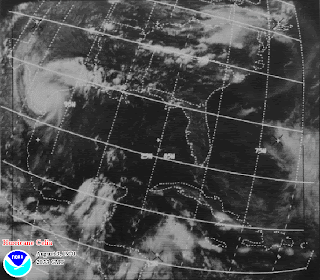
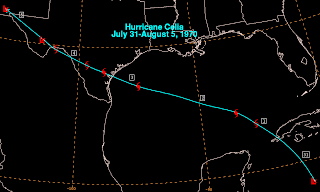

The next in my series of Atlantic Hurricanes is Hurricane Celia which made landfall in Texas on this date (August 3) in 1970. It was the strongest storm of that season.
Celia caused $453 million (1970 dollars) and killed 16 people in Cuba and Texas.
In terms of today's dollars, the estimate would be closer to $1.83 billion dollars, according to the NWS Corpus Christi.
Celia fluctuated in intensity while traversing the Gulf of Mexico. Shortly before it made landfall in Corpus Christi, TX, winds peaked at 125 mph.
Technically Celia was considered a Category 3 hurricane with maximum sustained winds of 125 at landfall. However, winds gusts were recorded as high as 180 mph.
The maximum rainfall from Celia in Texas was 7.26" in Robstown.
Celia maintained hurricane strength well inland, with damaging winds reported as far inland as Del Rio and Sanderson in southwest Texas.
According to the NWS Corpus Christi, "The wind gusts were confined to small areas "looking almost like a tiger's claw" over the city of Corpus Christi. One man, in his desciption of the wind burst, stated the sound of the gust was "like a giant hammer hitting the building."
Eight people drowned in the heavy surf and rip current generated by Celia, then located near the center of the Gulf of Mexico, appoximately 300 miles away.
Deaths indirectly caused by Celia occurrred along the Florida Panhandle, where 8 persons drowned in the heavy surf and rip current generated by Celia, then located near the center of the Gulf of Mexico, appox. 300 miles away.
Deaths indirectly caused by Celia occurrred along the Florida Panhandle, where 8 persons drowned in the heavy surf and rip current generated by Celia, then located near the center of the Gulf of Mexico, appox. 300 miles away.
The highest tides generated by Hurricane Celia were 9.2 feet above MSL and 9.0 feet above MSL, at Port Aransas Beach and Port Aransas Jetty, respectively. These occurred about 2:40 p.m., CDT, on the 3rd.
The following article refers to Weather Bureau employee Don Dunlap:
SEES IT AT ITS WORST
Texas Weatherman Keeps Tabs on Celia
CORPUS CHRISTI, Texas (UPI) ---It was approaching 5:30 p.m.
The little man who looked like Peter Lorre put on his baby-blue
parka again and stuck his head out the front door of the
Weather Bureau. He peered out for only a second, and then
lurched back inside to escape the stinging rain and high winds.
The man threw off his coat and sloshed through ankle-deep water
in a small, darkened room on the second floor. He aimed his
weakening flashlight on the only two meteorological devices
still working in Corpus Christi and then looked up. "It hit
140 knots---140 knots," he said. The watch on Donald A.
Dunlap's wrist just recorded the most intense moment of
Hurricane Celia. The needle on the mechanical wind gauge was
at 161 miles an hour. The barometer was at what would be its
lowest point of the day--28.46. "Be sure to mention how low
the barometer went," he said. "Everybody will be real
interested in that." When Hurricane Celia reached its
destructive heights on the Texas coast Monday, Dunlap was the
only weatherman still taking readings. As the winds began to
build, most of the weathermen huddled around the radar screen
to watch the progress of the storm. Dunlap, 52, stayed by his
barometer. "Gee whiz," said one meteorologist, if there's
anybody here who'll know what this hurricane will do it's old
Dunlap." Then the power went off, and windows began popping
out, water started flowing across the floor of the Weather
Bureau. Dunlap unscrewed the barometer from its case, and
walked with the water squishing in his shoes to the windowless
second floor room. With the barometer safe, Dunlap donned his
parka and made frequent dashes down the stairs to get the feel
of the winds, taking notes in a small book. Once one of his
co-workers caught sight of Dunlap in the darkened room and
called out to the others: "Hey, Dunlap thinks we're still
making readings." Dunlap was eating a sandwich. His round
face turned up from his notebook. "Yes," he said, "I'm making
a few observations."
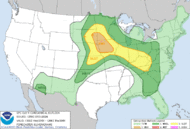
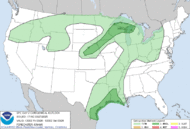
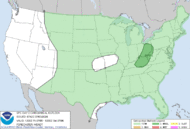
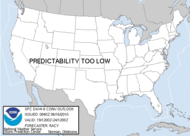






No comments:
Post a Comment